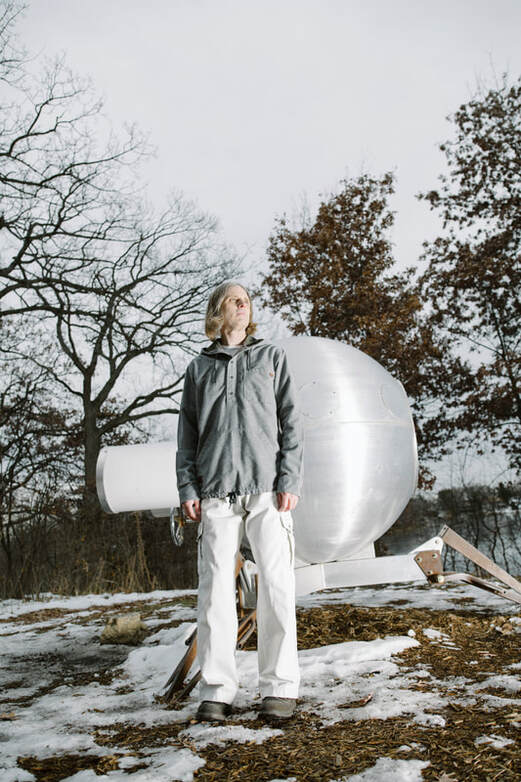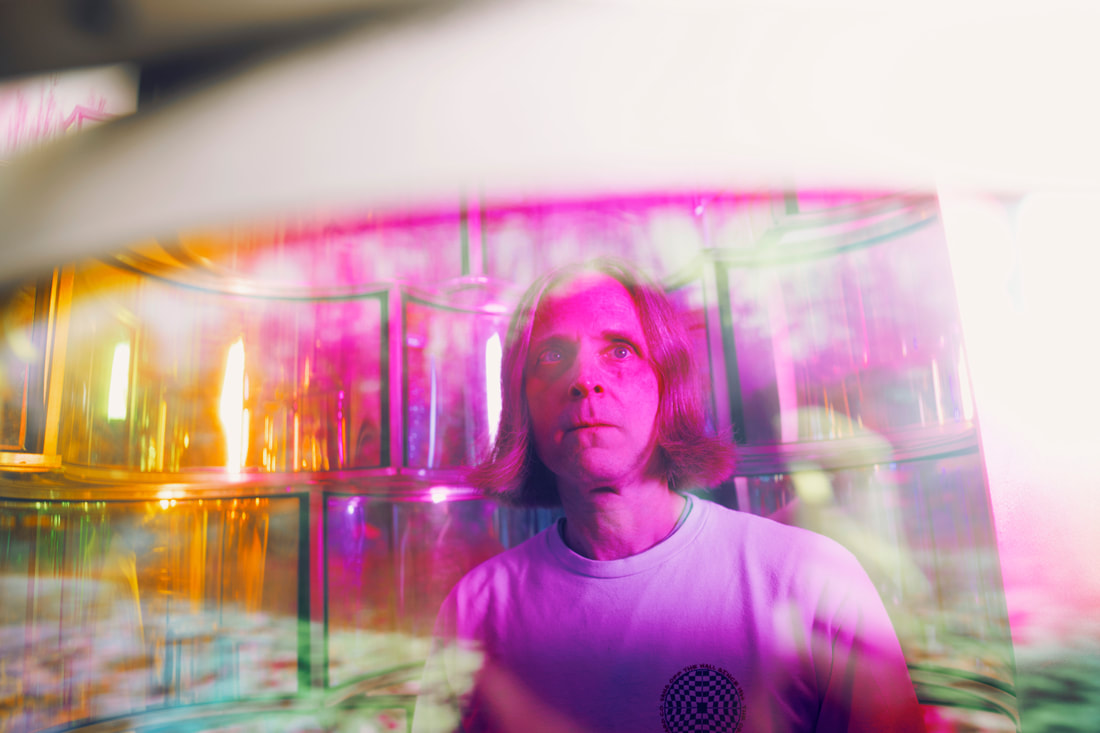
e / s \ c Interview
Q: I believe you got your start in the mid 90's. Can you talk about your history as an artist?
A: Sure, I've always been into music, but growing up I was mostly exposed to classical, or pop and rock songs on the radio. It wasn't until the mid-‘90s that I discovered electronic music, and it was like an explosion for me. I felt as though a new world opened up, and at first just wanted to soak it in. But after a while, I heard about this course at a local college that studied electronic sound. It lasted a full school year, and you'd get to use their equipment and compose music as well. So I enrolled, and that taught me a lot about making electronic music. I then purchased some used gear, mainly from the 1980s, and started creating songs on my own. From there, things just sort of evolved until I'd written and recorded enough music for an album. This record then sat dormant for many years, as I was sidetracked with one thing or another. But last year felt like the right time to finish it off, which is what finally happened.
Q: I was reading about some of your influences, like Aphex Twin and the Orb. For myself, Aphex Twin is a pioneer in the genre. I'm interested in knowing how your musical influences and non-musical influences mesh into your own signature sound? And have you ever collaborated with another artist?
A: I usually write the music first, which is definitely influenced by my favorite artists. I think the main threads are their approaches to rhythm and clean electronic sounds, plus the feeling I get while listening to them. So at first I'm aiming for a similar vibe, while also being open to going where the music and my impulses take me. Then at some point, I'll start to get an idea about what the song might be about. And that's more where the non-musical influences come in. With this music, I'm often trying to say something to myself I think I should hear. So these messages help shape the samples that get added on top. As for collaborations, I've never done this. I'd probably be open to it, though I do like working alone so it's not something I'm really looking for.
Q: What was your recording process like for Down To Earth?
A: I was living at the time by a recording studio some friends and I set up when we were in a band. Sometimes, when this space was unoccupied, I'd bring in my electronic gear and get everything in place. I then would set the input levels, press play, and let a song be recorded live. Since the instruments were all controlled by a MIDI sequencer, it was like hearing an orchestra play back in real time. After that came the mixing process, which definitely took longer. Though having only a basic lineup of effects and outboard gear made it easier. At this point, and especially working by myself, I needed a straightforward approach. And luckily that's the only option there was.
Q: I believe you got your start in the mid 90's. Can you talk about your history as an artist?
A: Sure, I've always been into music, but growing up I was mostly exposed to classical, or pop and rock songs on the radio. It wasn't until the mid-‘90s that I discovered electronic music, and it was like an explosion for me. I felt as though a new world opened up, and at first just wanted to soak it in. But after a while, I heard about this course at a local college that studied electronic sound. It lasted a full school year, and you'd get to use their equipment and compose music as well. So I enrolled, and that taught me a lot about making electronic music. I then purchased some used gear, mainly from the 1980s, and started creating songs on my own. From there, things just sort of evolved until I'd written and recorded enough music for an album. This record then sat dormant for many years, as I was sidetracked with one thing or another. But last year felt like the right time to finish it off, which is what finally happened.
Q: I was reading about some of your influences, like Aphex Twin and the Orb. For myself, Aphex Twin is a pioneer in the genre. I'm interested in knowing how your musical influences and non-musical influences mesh into your own signature sound? And have you ever collaborated with another artist?
A: I usually write the music first, which is definitely influenced by my favorite artists. I think the main threads are their approaches to rhythm and clean electronic sounds, plus the feeling I get while listening to them. So at first I'm aiming for a similar vibe, while also being open to going where the music and my impulses take me. Then at some point, I'll start to get an idea about what the song might be about. And that's more where the non-musical influences come in. With this music, I'm often trying to say something to myself I think I should hear. So these messages help shape the samples that get added on top. As for collaborations, I've never done this. I'd probably be open to it, though I do like working alone so it's not something I'm really looking for.
Q: What was your recording process like for Down To Earth?
A: I was living at the time by a recording studio some friends and I set up when we were in a band. Sometimes, when this space was unoccupied, I'd bring in my electronic gear and get everything in place. I then would set the input levels, press play, and let a song be recorded live. Since the instruments were all controlled by a MIDI sequencer, it was like hearing an orchestra play back in real time. After that came the mixing process, which definitely took longer. Though having only a basic lineup of effects and outboard gear made it easier. At this point, and especially working by myself, I needed a straightforward approach. And luckily that's the only option there was.
Q: What is your creative process like?
A: For this album, I wanted to make music that wasn't obviously pattern based. I also wanted the possibility of being surprised at the direction a song might take. This led me to record myself jamming and improvising on various instruments, until it felt like something was happening. I then overdubbed more parts, to the point where a rough idea existed in the MIDI sequencer. Next I'd pluck out the best sections, and save them as separate loops. I'd keep refining things until a potential song came into view. Finally, I triggered these sections in real time while recording it all to another sequencer. The result was more-or-less a finished song. Later on, I went into sampling mode and recorded from a bunch of sources. Eventually, samples were placed on top of the music to add the finishing touches.
Q: What are some themes that are touched upon in your release Down To Earth?
A: The most basic themes are about self-belief and self-healing, and finding answers from looking within. But as things moved along, these ideas grew into a mythical type of tale. The story follows a young man in the future who leaves an unfulfilling life on Mars, and travels to planet Earth. Once there, he gradually finds himself, starts healing his body and sets out on a new course.
Q: Have you started playing shows or virtual shows?
A: Not yet, I'm still working on that. It took 19 years to finish the album, so I guess it'll take a while to play it live too! But I definitely want to perform this music, and am getting it together right now. Since the record was made with old-school MIDI instruments, I'm staying away from computers as much as possible. It's a lot of work to reproduce everything with a few portable instruments, and is putting my inner librarian to task. But hopefully I'll be ready for a show sometime this summer. It'll be great to see it finally happen, so I'll keep plugging away.
Q: What else should we know about your music?
A: I should mention that 'e s c' stands for electric sonic council. Basically I'm trying to find something of personal value, and then express this in a musical form. Once there, it can hopefully be of some use while going through life. This project is like a labor of love, and I felt that it had to happen. But I also want the music to be accessible, and something others may enjoy as well. Ideally this is the case, but either way the journey and discovery are what keep me going after all.
A: For this album, I wanted to make music that wasn't obviously pattern based. I also wanted the possibility of being surprised at the direction a song might take. This led me to record myself jamming and improvising on various instruments, until it felt like something was happening. I then overdubbed more parts, to the point where a rough idea existed in the MIDI sequencer. Next I'd pluck out the best sections, and save them as separate loops. I'd keep refining things until a potential song came into view. Finally, I triggered these sections in real time while recording it all to another sequencer. The result was more-or-less a finished song. Later on, I went into sampling mode and recorded from a bunch of sources. Eventually, samples were placed on top of the music to add the finishing touches.
Q: What are some themes that are touched upon in your release Down To Earth?
A: The most basic themes are about self-belief and self-healing, and finding answers from looking within. But as things moved along, these ideas grew into a mythical type of tale. The story follows a young man in the future who leaves an unfulfilling life on Mars, and travels to planet Earth. Once there, he gradually finds himself, starts healing his body and sets out on a new course.
Q: Have you started playing shows or virtual shows?
A: Not yet, I'm still working on that. It took 19 years to finish the album, so I guess it'll take a while to play it live too! But I definitely want to perform this music, and am getting it together right now. Since the record was made with old-school MIDI instruments, I'm staying away from computers as much as possible. It's a lot of work to reproduce everything with a few portable instruments, and is putting my inner librarian to task. But hopefully I'll be ready for a show sometime this summer. It'll be great to see it finally happen, so I'll keep plugging away.
Q: What else should we know about your music?
A: I should mention that 'e s c' stands for electric sonic council. Basically I'm trying to find something of personal value, and then express this in a musical form. Once there, it can hopefully be of some use while going through life. This project is like a labor of love, and I felt that it had to happen. But I also want the music to be accessible, and something others may enjoy as well. Ideally this is the case, but either way the journey and discovery are what keep me going after all.

